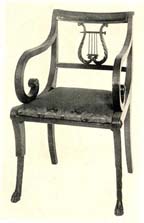Duncan Phyfe
The star of the legendary Loan Exhibition of American Antiques sponsored by the Girl Scouts of America was a Scottish born New York cabinetmaker named Duncan Phyfe (1768-1854). Held in New York City in 1929, the show was described by the New York Sun as "The finest display of American furniture ever got together in one place." In his book, American Treasure Hunt, legendary antique furniture dealer Harold Sack described it as "a historic event that expanded public consciousness." While distinguished benefactors including Francis Garvan (establisher of the Yale collection), the Rockefellers (patrons of Colonial Williamsburg) and Henry du Pont (founder of Delaware's Winterthur Museum) loaned only one or two masterpieces per shop made by other pioneer cabinetmakers to the event, furniture bearing the label or attributed to Phyfe's business numbered an amazing forty-eight.
 An entire section of the catalog was dedicated to the successful businessman who in an 1816 bill to Charles N. Bancker, Esq. of Philadelphia, charged $22 per chair, $122 for a sofa and $265 for a Piere table-staggering prices at the time. The exhibition booklet is a collector's item today. The Phyfe section preamble reads: "Practically unknown a few years ago the name of Duncan Phyfe has today become the plaything of every auctioneer, every furniture dealer and every furniture buyer in the country. Every man's work during the first years of the 19th century is foisted on poor old Phyfe."
An entire section of the catalog was dedicated to the successful businessman who in an 1816 bill to Charles N. Bancker, Esq. of Philadelphia, charged $22 per chair, $122 for a sofa and $265 for a Piere table-staggering prices at the time. The exhibition booklet is a collector's item today. The Phyfe section preamble reads: "Practically unknown a few years ago the name of Duncan Phyfe has today become the plaything of every auctioneer, every furniture dealer and every furniture buyer in the country. Every man's work during the first years of the 19th century is foisted on poor old Phyfe."
With 1784 conditions in Scotland filled with "dearth and distress" the Fife family voyaged the Atlantic. Duncan's father opened up a cabinetmaking shop in Albany, NY. Sadly, two siblings died on the trip. Completing his apprenticeship, the first mention of Duncan Fife as a furniture "joiner" was at 2 Broad Street; registered in the 1792 NYC Directory. He relocated, expanded and changed his name to Phyfe two years later. Presumably, the quiet, industrious, god-fearing young man of retiring disposition felt the new title would be more appealing in era filled with anti -British sentiment and allow him to better compete with French émigré' craftsmen.
His early furniture never strayed far from English Sheraton Style pattern books. French Classical Directoire and Empire style would influence his later work. Despite this reliance on continental design, the quality of Phyfe's craftsmanship, beautiful proportioning, elegance of line and choice of superior wood (he was said to have paid as high as $1000 for a single Santo Domingo mahogany log) establish him as perhaps the most important influencer of the Federal Period-America's patriotic interpretation of late 18th/early 19th century European design.
Duncan Phyfe is the only cabinetmaker in America whose name is coupled to various styles of furniture: double pedestal banquet tables, reeded leg sofas, window benches, central pedestal drop leaf breakfast tables, Martha Washington sewing stands, window benches, lyre back chairs, etc. Decorative carving, turning and form motifs associated (although certainly not unique) to his shop are: reeding, thunderbolts, trumpets, rosettes, acanthus leave, water leaf, palm leaf, lion's foot, dog's foot, eagle wings, drapery swags, wheat ears, the saber leg, urn turned posts, curved or diagonal cross bars on chair backs and perhaps his most expressive element, the lyre.
A pioneer of the industrial revolution, at one time Phyfe employed over a hundred workers at his cabinetmaking shop. Although the number of pieces produced there is surely enormous, comparatively few marked or labeled pieces (app. 20) have been found extant. Prices attained for his pieces include: $11,000 for a labeled card table, $24,200 for a three post tilt top tea table, $13,200 for a cellaret and $93,500 for a satinwood sewing table.
Duncan Phyfe's name is what distinguished him from his contemporaries. It had nothing to do with changing spelling however. It had to do with hanging it, on a sign, over his door stoop. The artisans and merchants who came to America discovered a unique kind of freedom. They were no longer restricted by class and guild traditions of Europe. For one of the first times in history, a man learned that by working hard he could build his business based his own name and reputation and quality of work. One of those entrepreneurs was a gentle Scotsman named Duncan Phyfe.

